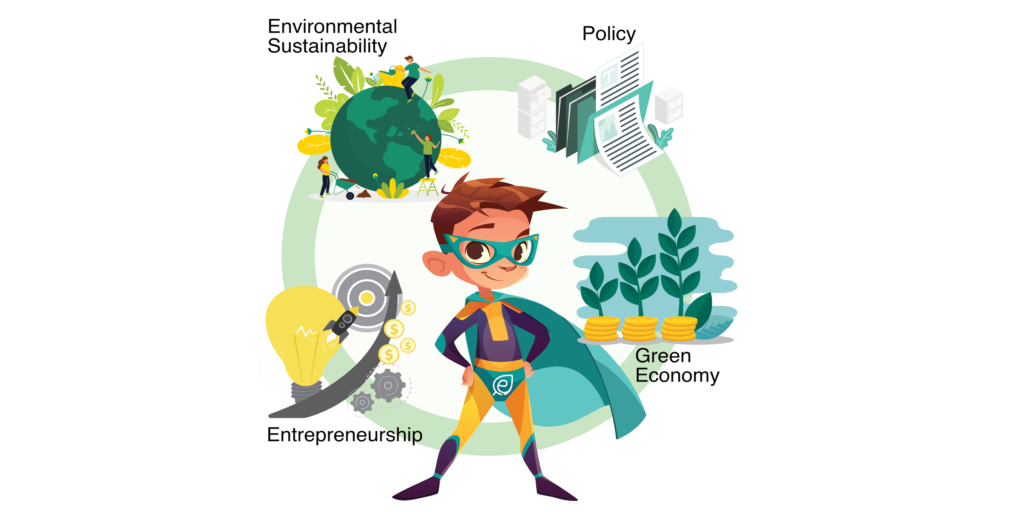John Dilyard 1 Shasha Zhao 2
1St Francis College, United States 11201-4305
2University of Surrey, United Kingdom GU2 7JN
*Corresponding Author Email: shasha.zhao@surrey.ac.uk …
Highlights
- The achievement of the SDGs requires the participation of the private sector
- Climate change is mainly a byproduct of a failure by governments to adequately address climate change by not weaning themselves off of fossil fuel resources
- Governments recognize that renewables must replace fossil fuels eventually but there really is no clear sign that this will be done with a sense of urgency
- Private sector firms are filling the institutional void left by governments with respect to combating climate change and working toward the SDGs
Graphical Abstract

On August 19, 2019, 181 American CEOs, and members of the Business Roundtable, signed what they called a new “Statement of the Purpose of a Corporation.” By signing the statement, the CEOs signaled that the Milton Friedman-inspired view that firms best serve society by focusing first on the stockholders is over, replaced by the belief that the measure of a company’s success is how well it serves all its stakeholders and society. As the new statement indicated, firms would now be committed to delivering value to their customers, investing in their employees, dealing ethically with their suppliers, supporting local communities, and generating long-term value for their shareholders. The statement’s impact extended beyond the American firms headed by the CEO who endorsed it.
Observers of the status quo with respect to how firms defined their relationship with stakeholders and society did not consider the statement to be as earth-shaking as it appeared. About four years earlier, in December 2015, the United Nations unanimously approved Agenda 2030 – the Sustainable Development Goals (SDGs) – which redefined the purpose of all segments of society, including governments, policymakers, individuals, and the private sector (Mensah, 2019). According to the SDGs, all segments of society should work together to build a safer and more equitable world, which protects the rights of all the Earth’s inhabitants and the living environment.
It is widely acknowledged that the achievement of the SDGs requires the participation of the private sector, and firms took note. Today, it is exceedingly rare to find any company, regardless of its size, that does not state somewhere what it is doing to demonstrate either its dedication to being socially responsible, its commitment to reducing its carbon footprint, or its support of the SDGs. Indeed, one could argue that some firms recognized, even before 2015, that being a good ‘corporate citizen’ and ‘being green’ was good for business.
Unfortunately, six months after the release of these new guidelines for how companies should operate, the COVID-19 pandemic came and delivered a literal slap in the face to how the world economy functions and operates. Since then, the meaning of providing value to customers was, and continues to be, challenged. Similarly, relationships between employers and employees were, and continue to be questioned as companies redefines what it means to support the communities in which they operate. Consequently, firms’ ability to generate long-term value for their shareholders now requires an even longer point of view. Essentially, the last two years have prompted firms to look inward at how the entirety of their processes affect them rather than look at how what they do affects others. Governments, too, have become more introspective, more concerned about how the global economy does or does not benefit their nation’s economy, and are questioning whether disengaging more extensively from the global economy can protect their economies from future shocks. This introspection is accompanied by less concern about global society, the planet, and the SDGs (Safitri et al., 2021). Consequently, the last two years have not been fortuitous ones with respect to making much progress on either a new vision of the purpose of a corporation, the environment, or the SDGs.
The world is currently months into an egregious war of aggression that is presenting yet another painful reminder of how vulnerable the global economy is to unexpected events. Now more than ever, governments are being forced to divert their attention from taking needed action on long-term programs, such as those that focus on climate change. It is sadly ironic, though, that the climate change is mainly a byproduct of a failure by governments to adequately address climate change by not weaning themselves off of fossil fuel resources, the purchase of which has helped finance this war. As a result, at least in the near term, their solution to the disruptions in energy markets caused by the war is to substitute Russian oil and gas for oil and gas sourced elsewhere. Whilst governments recognize that renewables must replace fossil fuels eventually, there really is no clear sign that this will be done with a sense of urgency. Their already woeful track record in meeting the reductions in carbon emissions needed to slow climate change is a testament to that. The same unfortunate track record applies to the SDGs.
However, there also is something quite interesting going on, something beyond government-imposed sanctions against Russia and government-sponsored relief of all kinds for Ukraine. The private sector has stepped up to punish Russia. At last count, over 750 companies of all sizes have announced they are curtailing business activities in Russia beyond what is required by the strictures of sanctions. To be sure, some of this is in response to public outrage and pressure, but some of it also could be the manifestation of the values firms have been espousing increasingly in pursuit of that new purpose of corporations, as well as their vision of what it means to be socially responsible. Whether or not firms would have left Russia without the implementation of sanctions is of course debatable, but for the sake of argument, let us say that they would.
Assuming that the desire to do something positive about the SDGs firms were expressing before the pandemic was just paused, not abandoned, and that their post-COVID strategies will revolve around those twin desires, private sector firms are filling the institutional void left by governments with respect to combating climate change and working toward the SDGs. We wish to posit that the only way for the private sector to embrace a new purpose truly, and truly do good, is by filling that void. We believe, that multinational corporations are especially well-suited for this task. They have tremendous influence over global supply chains (Oelze & Habisch, 2018) and can use their growing realization that dealing ‘fairly and ethically’ with their suppliers extends to reducing their carbon footprints to build momentum toward the achievement of the SDGs. We realize the irony in asking firms to fill an institutional void left by governments, especially since they have proven adept at exploiting institutional voids. But firms, especially successful firms, also are adept at reading the winds of change and recognizing how they need to adapt to survive and prosper. Furthermore, climate change is a threat to their survival, as is an increasingly unequal and less safe world. Therefore, it is in the best interests of these firms to mitigate those threats. Despite the universal acceptance of Agenda 2030, too many governments have largely abrogated their responsibility to achieve it. Ultimately, while the private sector did not sign Agenda 2030, it is in a unique position to see the agenda to fruition. If it takes filling the void left by government inaction, so be it.
Related Video
References
Mensah, J. (2019). Sustainable Development: Meaning, History, Principles, Pillars, and Implications for Human Action: Literature Review. Cogent Social Sciences, 5(1), 1653531. [Google Scholar] [CrossRef]
Oelze, N. & Habisch, A. (2018). Responsible Supply Chain Implementation-Are Multinational Companies gods and Small and Medium Sized Enterprises Oxen? Journal of Cleaner Production, 179, 738-752. [Google Scholar] [CrossRef]
Safitri, Y., Ningsih, D., Agustianingsih, P., Sukhwani, V., Kato, A. & Shaw, R. (2021). Covid-19 Impact on SDGs and the Fiscal Measures: Case of Indonesia. International Journal of Environmental Research and Public Health, 18(6), 2911. [Google Scholar] [CrossRef]
About this Article
Cite this Article
APA
Dilyard J. & Zhao S. (2023). Can Corporations Fill the Agenda 2030 Void Left by Governments? SustainE. 1(1), 144-146.
Chicago
Dilyard John and Zhao Shasha. “Can Corporations Fill the Agenda 2030 Void Left by Governments?” SustainE 1, no. 1 (May 1, 2023): 144-146.
Received
12 November 2022
Accepted
26 April 2022
Published
1 May 2023
Corresponding Author Email: shasha.zhao@surrey.ac.uk
Disclaimer: The opinions and statements expressed in this article are the authors’ sole responsibility and do not necessarily reflect the viewpoints of their affiliated organizations, the publisher, the hosted journal, the editors, or the reviewers. Furthermore, any product evaluated in this article or claims made by its manufacturer are not guaranteed or endorsed by the publisher.
Distributed under Creative Commons CC-BY 4.0
Share this article
Use the buttons below to share the article on desired platforms.













